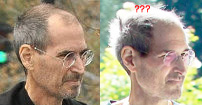Got a tip for us?
Let us know
Become a MacRumors Supporter for $50/year with no ads, ability to filter front page stories, and private forums.
Steve looks really sick, poor guy
- Thread starter iphone1105
- Start date
- Sort by reaction score
You are using an out of date browser. It may not display this or other websites correctly.
You should upgrade or use an alternative browser.
You should upgrade or use an alternative browser.
I think in his case cancer would have won either way.Whipple procedure + Liver replaced equals too many important items (read: organs) removed from the body. When will western medicine learn that "slice n dice" virtually never is a remedy for cancer.
I wish I could have convinced Steve of this 7 years ago, but why would he listen to me?
Steve trusted cancer doctors, which was his big mistake.
This post may inflame many, especially adherents to established medicine.
Whipple procedure + Liver replaced equals too many important items (read: organs) removed from the body. When will western medicine learn that "slice n dice" virtually never is a remedy for cancer.
I wish I could have convinced Steve of this 7 years ago, but why would he listen to me?
Steve trusted cancer doctors, which was his big mistake.
This post may inflame many, especially adherents to established medicine.
Perhaps you could provide some links to lessen the 'flames'.
I think in his case cancer would have won either way.
That is a bold assumption. What I do know is that virtually no one survives a whipple procedure for very long, and that is only part of the organs that were removed from Steve.
----------
Uh, if you're going to be posting inflammatory comments toward Western medicine, you should back them up with at least some sort of evidence so as not to make you to appear as if you blindly believe it. Supplementing it with more vitriolic remarks when asked to provide evidence isn't going to help your case, either.
Not that this is a really appropriate discussion to hold here anyway.
Does western medicine have a cure for cancer?
The thing that stands out for me, which no one else seems to have mentioned, is that the other man is physically holding Steve up/assisting him due to being weak.
Some have said the other man is "posing", which is ridiculous when he's quite clearly simply either looked in that direction as the photo was taken, or has clocked the photographer at the moment the photo was taken.
However, he's quite clearly helping Steve walk, yet no ones mentioned that.
I don't want to believe he's that badly ill, but remember WWDC and how weak and wobbly his voice was, it had never sounded that weak. He also looked off balance at times, and it's all very, very tragic.
I know it comes to us all, as others have reminded us on numerous occasions in this thread, but the Apple community is so unique in that we fell behind Steve and his vision for the future of the company, and as such we do feel a certain affinity for him.
I wish Steve all the very best, but it angers me how rapists, child molesters, murderers, and the like live until their old age with no serious illness yet innovative, great minded, good, decent people are struck down in their prime with evil illnesses like cancer.
I did mention it but then redacted my comments. It is clear the other man is a hospice nurse and the people in this thread are very, very ignorant about end-of-life care. It is surprising that he is not using a two-wheeled walker to assist him.
This isn't directed to you, Weegie, but one thing we should be sensitive of is to stop wishing Steve to "get well" or "feel better." There IS no getting well. We should be wishing and praying (if you are so inclined) for him to not feel any pain for the remainder of his life.
The photo was photoshopped. Look at the hand. Steve is not an alien but human. Right?
I found very similar real photo in the internet.
Attachments
I stand by the photo being photoshopped ... I made this to point out what really stands out to me
Regarding the hospice caretaker's legs, he's a hairy guy and there's a bright, direct backlight. That will cause the "white outline" which you think is a Photoshop effect.
And also this thread IS sickening. Stop bitching about fake-vs-real and have some sympathy for Christ's sake.
Yes of course it's fake.
Don't worry about the arguments here. I mean, who cares. Obviously, no one is seeing this. Everyone knows it's fake otherwise it would be everywhere, and presently it's just at the dimwit forums (that I frequent )
)
Steve still has a couple weeks, so relax!
Have a beer. Be glad your not that Photoshopped guy (as he looks like he was sloped together like a Frankenstein monster)
Don't worry about the arguments here. I mean, who cares. Obviously, no one is seeing this. Everyone knows it's fake otherwise it would be everywhere, and presently it's just at the dimwit forums (that I frequent
Steve still has a couple weeks, so relax!
Have a beer. Be glad your not that Photoshopped guy (as he looks like he was sloped together like a Frankenstein monster)
I stand by the photo being photoshopped ... I made this to point out what really stands out to me
lol, really? the blond guys thick leghair? you lost all credibility on the bottom of the gown looking strange as you have shown a lack of understanding of how light and photography works. I don't think anybody is questioning that the blond guy was there and not inserted in the photo, and even that steve was in it. the only question was if they compressed part of steve sideways to make it worse-resulting in the strange little stagger in the neck.
and the other image analysis is a joke too, but the shadow on the neck is a little strange so I won't say impossible that body was compressed, but the background shows no obvious effects.
----------
The photo was photoshopped. Look at the hand. Steve is not an alien but human. Right?
I don't see anything wrong with the hand, just your brain. Just had his sleeve rolled up a little high it looks like.
Regarding the hospice caretaker's legs, he's a hairy guy and there's a bright, direct backlight. That will cause the "white outline" which you think is a Photoshop effect.
And also this thread IS sickening. Stop bitching about fake-vs-real and have some sympathy for Christ's sake.
I agree. Just quit the photoshop debate already.
lol, really? the blond guys thick leghair? you lost all credibility on the bottom of the gown looking strange as you have shown a lack of understanding of how light and photography works. I don't think anybody is questioning that the blond guy was there and not inserted in the photo, and even that steve was in it. the only question was if they compressed part of steve sideways to make it worse-resulting in the strange little stagger in the neck.
and the other image analysis is a joke too, but the shadow on the neck is a little strange so I won't say impossible that body was compressed, but the background shows no obvious effects.
----------
I don't see anything wrong with the hand, just your brain. Just had his sleeve rolled up a little high it looks like.
You do not have to be a photography major to conclude that this is two images merged in photoshop ... and a sloppy job at that.
If you do not see the part near the hand ... then your eyes are failing you.
I bet I could take a picture of something while some of you people watch, and you'd all still scream fake.
All the 'mistakes' seem a little too obvious don't you think, if someone was going to fake it, they would do a good job, and I'm suer TMZ did their due research before they bought it and put it up on the site...
All the 'mistakes' seem a little too obvious don't you think, if someone was going to fake it, they would do a good job, and I'm suer TMZ did their due research before they bought it and put it up on the site...
Agree.And also this thread IS sickening. Stop bitching about fake-vs-real and have some sympathy for Christ's sake.
Anybody who has a family member or close friends knows how tough it is to caring and helping them through their ordeal. Let's focus on what he's done instead whether or not the image has been altered.
Thanks for the link.
Now, where exactly is this driveway? Where was the photographer standing when the picture was shot?
Are a bunch of paparazzi photographers wandering around Steve's house?
You do not have to be a photography major to conclude that this is two images merged in photoshop ... and a sloppy job at that.
If you do not see the part near the hand ... then your eyes are failing you.
well one of us is wrong, we'll see how this unfolds. And your statement basically sums up the problem, maybe you need to be a photography major to make an informed conclusion, so random things like backlit leghair, or crappy image/camera sensor quality don't set off your fake alert. Camera phone sensors are pretty crappy and do some interesting things. Not sure of the camera here but it was likely in a moving car through a window.
I think people who see photoshop artifacts here are just like the people who see Jesus in burnt toast.
Last edited:
Agree.
Anybody who has a family member or close friends knows how tough it is to caring and helping them through their ordeal. Let's focus on what he's done instead whether or not the image has been altered.
No, let's focus on how this is focused.
Let's get to the bottom of this, as that's what this thread is about.
This thread is about people who can see clearly, and people who need bifocals .
Some medics' opinion on the subject
http://www.medpagetoday.com/Oncology/OtherCancers/28195
In this one also have some nice pictures:
http://www.mercurynews.com/health/ci_18758697
http://www.medpagetoday.com/Oncology/OtherCancers/28195
In this one also have some nice pictures:
http://www.mercurynews.com/health/ci_18758697
Last edited:
Thanks for the link.
Now, where exactly is this driveway? Where was the photographer standing when the picture was shot?
Are a bunch of paparazzi photographers wandering around Steve's house?
there's another link earlier that takes you into street view at the exact angle and spot of the photo pretty much.
I'm going to post one of the most influential photos I've ever seen in my life to do my part to bring sanity back to this madhouse.
Image
That is quite a gem. Thank you.
I'm going to post one of the most influential photos I've ever seen in my life to do my part to bring sanity back to this madhouse.
Image
clearly shopped, you can tell from the pixels.
I'm going to post one of the most influential photos I've ever seen in my life to do my part to bring sanity back to this madhouse.
Image
This actually reminded me of this:
http://articles.economictimes.india...3_1_steve-jobs-resignation-steve-wozniak-ipad
Steve Jobs resignation: India didn't offer enlightenment but changed his outlook
NEW DELHI: The year was 1973. The Vietnam War was still raging, the Watergate scandal had blown up, and angsty, disillusioned young Americans were hanging on to the counterculture movement for dear life.
That's when an 18-year-old from San Francisco dropped out from college, took a psychedelic leaf out of the Beatles' transcendental book and headed for the Himalayas, with friend Daniel Kottke, in search of 'enlightenment'.
Steve Paul Jobs traversed the loopy roads of Uttarakhand and ended up at the ashram of Baba Neeb Karori, near Ranikhet. The mystic saint had just died. Jobs never got the enlightenment he was looking for, but did return to California in Indian clothes, and a Buddhist. Three years later, in 1976, a hippie startup took wing with the revolutionary idea of personal computing. Jobs co-founded Apple with fellow dropout Steve Wozniak.
---------------------------------------------------
I'll be completely honest here. Tim Cook is a logistics genius. Best choice for CEO, easily.
But he's no Steve Jobs.
As long as Steve is somehow involved, that's great. But when he's gone, I wonder where the "big ideas", the seemingly crazy, yet game-changing ideas will come from. The ideas that were completely out of left field, the ones that took everyone by surprise, but ended up redefining consumer tech as we know it. The ones that ended up schooling the naysayers.
Now we don't know whether these ideas were mostly Jobs' babies, or whether others also experienced the sort of special moments he must have had when he hit upon something truly special. I do have a feeling, however, that Jobs was the source of a lot of them. Which, while I hope is not entirely true, wouldn't be the best news for a sans-Jobs Apple.
Jobs had the Apple "big picture" firmly in view. And he understood what it took to make it materialize and become a guidance for the entire industry. It was very much a part of him and his vision. I doubt that anyone else there has that sort of talent and prescience. Yes, Apple will still be successful. But will they be as peerless and, I daresay transcendent, as before? Will that prescience still be there? Can a post-Jobs Apple pull off an October 2001, or a June 2007, or even more significantly, a January 2010? These were watershed moments by which the passage of time in tech can be marked.
Last edited:
I know I'm only making worse the "fake-vs-real" argument, but can someone compare the height of the RX350 SUV (67.7" I think) behind him, compared to the height of Steve Jobs (6'2"), and figure out the height of the man "holding" him? That may help gauge the real/fakeness of this picture.
Register on MacRumors! This sidebar will go away, and you'll see fewer ads.





